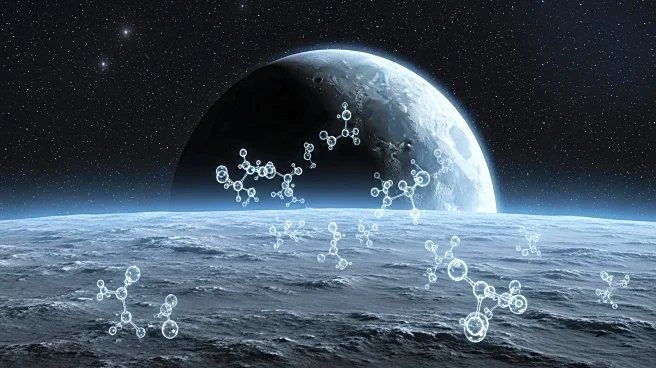What's Happening?
Recent analysis of archival data from the Cassini spacecraft has confirmed the presence of organic molecules in the icy jets of Saturn's moon Enceladus. These molecules, considered the building blocks of life, were found in ice grains sampled directly from the moon's surface. The study, published in Nature Astronomy, clarifies that these organic compounds originated from Enceladus's subsurface ocean, rather than forming after exposure to space radiation. This discovery strengthens the hypothesis that Enceladus's hidden ocean could be habitable. The data was collected by the Cosmic Dust Analyzer (CDA) during Cassini's flybys, which ended in 2017. The CDA captured and analyzed ice grains from the moon's plumes, confirming the presence of complex organic compounds.
Why It's Important?
The confirmation of organic molecules originating from Enceladus's ocean is a significant step in the search for extraterrestrial life. It enhances the moon's status as a prime candidate for habitability beyond Earth. The presence of these molecules suggests that Enceladus has the necessary ingredients for life, potentially supporting biological processes similar to those on Earth. This discovery could influence future space exploration priorities, with Enceladus becoming a focal point for missions aimed at finding life. The findings also contribute to our understanding of planetary systems and the conditions that might support life elsewhere in the universe.
What's Next?
Following Cassini's revelations, there is a growing consensus among scientists that a dedicated mission to Enceladus is necessary to further explore its potential for life. Proposed missions, such as NASA's Enceladus Orbilander and a similar concept by the European Space Agency, aim to orbit the moon, sample its plumes, and potentially land near the south pole to collect surface samples. These missions could provide direct evidence of life by analyzing the moon's ice and ocean. The prioritization of Enceladus by international space agencies underscores its importance in answering fundamental questions about life's exclusivity to Earth.
Beyond the Headlines
The discovery of organic molecules on Enceladus raises ethical and philosophical questions about humanity's place in the universe. It challenges the notion of Earth as the sole cradle of life and opens discussions on the implications of finding life elsewhere. The potential habitability of Enceladus could lead to long-term shifts in space exploration strategies, focusing on moons and planets with subsurface oceans. Additionally, the technological advancements required for missions to Enceladus could drive innovation in spacecraft design and remote sensing capabilities.









